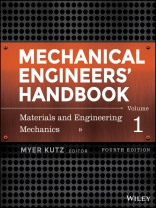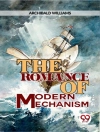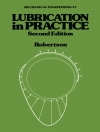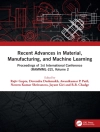Full coverage of materials and mechanical design in
engineering
Mechanical Engineers’ Handbook, Fourth Edition provides a
quick guide to specialized areas you may encounter in your work,
giving you access to the basics of each and pointing you toward
trusted resources for further reading, if needed. The accessible
information inside offers discussions, examples, and analyses of
the topics covered.
This first volume covers materials and mechanical design, giving
you accessible and in-depth access to the most common topics you’ll
encounter in the discipline: carbon and alloy steels, stainless
steels, aluminum alloys, copper and copper alloys, titanium alloys
for design, nickel and its alloys, magnesium and its alloys,
superalloys for design, composite materials, smart materials,
electronic materials, viscosity measurement, and much more.
* Presents comprehensive coverage of materials and mechanical
design
* Offers the option of being purchased as a four-book set or as
single books, depending on your needs
* Comes in a subscription format through the Wiley Online Library
and in electronic and custom formats
Engineers at all levels of industry, government, or private
consulting practice will find Mechanical Engineers’ Handbook,
Volume 1 a great resource they’ll turn to repeatedly as a
reference on the basics of materials and mechanical design.
विषयसूची
Preface ix
Vision for the Fourth Edition xi
Contributors xiii
Part 1 Materials 1
1. Carbon and Alloy Steels 3
Bruce L. Bramfitt
2. Stainless Steels 39
James Kelly
3. Aluminum Alloys 61
J. G. Kaufman
4. Copper and Copper Alloys 117
Konrad J. A. Kundig and Robert D. Weed
5. A Guide to Engineering Selection of Titanium Alloys for Design 229
Matthew J. Donachie
6. Nickel and Its Alloys 267
Gaylord D. Smith and Brian A. Baker
7. Magnesium and Its Alloys 289
Robert E. Brown
8. A Guide to Engineering Selection of Superalloys for Design 299
Matthew J. Donachie, John Marcin, and Stephen J. Donachie (deceased)
9. Thermoplastics, Thermosets, and Elastomers–Descriptions and Properties 353
Edward N. Peters
10. Composite Materials 401
Carl Zweben
11. Smart Materials 439
James A. Harvey
12. Overview of Ceramic Materials, Design, and Application 453
R. Nathan Katz
13. Electronic Materials and Packaging 475
Warren C. Fackler
14. Sources of Material Data 515
J. G. Kaufman
15. Quantitative Methods of Materials Selection 531
Mahmoud M. Farag
Part 2 Engineering Mechanics 553
16. Stress Analysis 555
Franklin E. Fisher
17. Force Measurement 623
Patrick Collins
18. Resistive Strain Measurement Devices 659
Mark Tuttle
19. An Introduction to the Finite-Element Method 681
Tarek I. Zohdi
20. Failure Models: Performance and Service Requirements for Metals 703
J. A. Collins, G.P. Potirniche, and S. R. Daniewicz
21. Failure Analysis of Plastics 771
Vishu Shah
22. Failure Modes: Performance and Service Requirements for Ceramics 789
Dietrich Munz
23. Viscosity Measurement 809
Ann M. Anderson, Bradford A. Bruno, and Lilla Safford Smith
24. Tribology Measurements 837
Prasanta Sahoo
25. Vibration and Shock 861
Singiresu S. Rao
26. Acoustics 885
Jonathan D. Blotter, Scott D. Sommerfeldt, and Kent L. Gee
27. Acoustical Measurements 953
Brian E. Anderson, Jonathan D. Blotter, Kent L. Gee, and Scott D. Sommerfeldt
Index 997
लेखक के बारे में
MYER KUTZ holds engineering degrees from the Massachusetts Institute of Technology and Rensselaer Polytechnic Institute. He has worked with numerous professional and technical publishing houses as an executive or consultant and is the author or editor of more than 15 engineering reference books.












